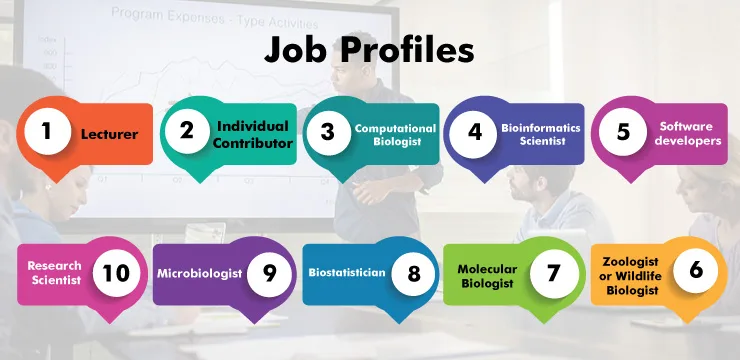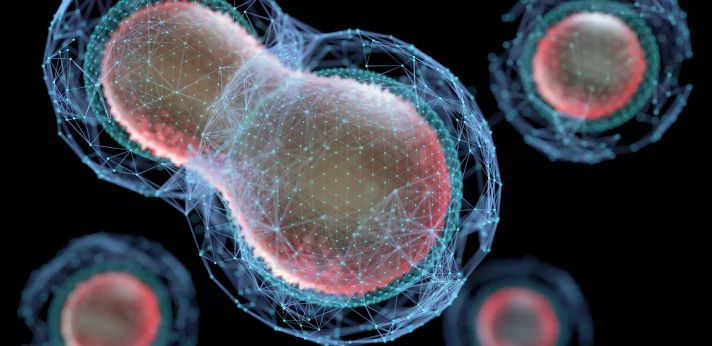Career in Bioinformatics in India: Biology accommodates many other fields as time progresses. In the earlier days, biology was simply an observational science, but now it has transformed into experimental and data science. If you have ever wondered what genomic structures look like and how they can be explored, then Bioinformatics is the right career.
It is said that Bioinformatics is best suited for those who have a passion or interest in computer science, life science, and mathematics because it is a mixture of all these fields. This article will give you an inside review of bioinformatics careers in India and the jobs available after taking a bioinformatics course.
You may have heard the term Bioinformatics but wondered what it means. Bioinformatics is quite exciting and entertaining at the same time since a genetic code unfolds an enormous amount of data. Suppose you always want to explore information regarding a particular disease, a person’s behaviour or anything linked with genomic structures. In that case, Bioinformatics is the best tool to pursue your dream career. Hopefully, this article will help clarify all your queries about bioinformatics courses and career aspects.
[Index]
Quick Facts
| Particulars | Description |
|---|---|
| Courses | B.Sc, B.Tech, B.E in Bioinformatics, M.Tech, MS in Bioinformatics |
| Duration | 1-5 years |
| Eligibility | 10+2 |
| Admission Procedure | Lecturer, Individual Contributor, Computational Biologist, Bioinformatics Scientist, Software developer, Research Scientist |
| Average Salary | 3-4L |
| Job Profile | Impressive critical thinking, Problem-solving, Analytical reasoning, Advanced mathematical skills, and Programming Skills |
| Skills | Impressive critical thinking, Problem-solving, Analytical reasoning, Advanced mathematical skills, Programming Skills |
| Top Recruiters | Wipro, Reliance, Satyam, Tata Consultancy Services, IBM Life Sciences, Ranbaxy |
What is Bioinformatics?
Bioinformatics is a branch of life science where Biology meets Technology. It combines Biology, Computer Science and Statistics to collect biological information using computer technologies and analyse it with the help of mathematics and statistics. Some particular fields of Biochemistry influence Chemistry and Biochemistry to solve biological problems on the molecular and cellular levels.
More precise and faster computer software has been introduced for better data analysis and faster operations. Bioinformatics course will help you use these computer technologies to store, process, manage and retrieve a large amount of data.
What does a Bioinformatics Scientist do?
A person who practices Bioinformatics and has studied a course is generally called a Bioinformatics Scientist or Bioinformatics Specialist. Biological processes are becoming complex as the world advances, and managing and interpreting such data is nearly impossible.
A Bioinformatics Scientist studies the structure and alignment of proteomics, raw microarray, and genomic sequence data. They spend much time inside a bioinformatic laboratory with computers and microscopes, and it is their job to conduct experiments and collect data for future interpretations.
Other works of a Bioinformatics Scientist may include gene finding, sequence alignment, genome assembly, protein-protein interactions, nucleotide and amino acid alignment, protein folding, alignment of DNA, and analysis of the following gene of a data sequence.
Various Bioinformatics Courses in India
To work as a Bioinformatics Scientist or make a career in Bioinformatics, one can earn a degree by following a Bioinformatics course.
Undergraduate Course
The following are the undergraduate courses for bioinformatics:
| Course Name | Duration |
|---|---|
| Diploma in Bioinformatics | 1 year |
| Bachelor of Science (B.Sc.) in Bioinformatics | 3 years |
| Bachelor of Technology (B.Tech.) / Bachelor of Engineering (B.E.) in Bioinformatics | 4 years |
| Bachelor in Science – Honors (B.Sc. Hons) in Bioinformatics | 3 years |
| Certificate in Bioinformatics | 1 year |
Postgraduate course
The following are the postgraduate courses for bioinformatics:
| Course Name | Duration |
|---|---|
| Master of Technology (M.Tech.) / Master of Engineering (M.E.) in Bioinformatics | 2 years |
| Master of Science (M.Sc.) in Bioinformatics | 2 years |
| Master of Science – Honors (M. Sc Hons) in Bioinformatics | 2 years |
| Master of Science (MS) in Bioinformatics | 2 years |
| Post Graduate Diploma in Bioinformatics | 1 year |
PhD course
The following is the PhD course for a career in bioinformatics:
| Course Name | Duration |
|---|---|
| PhD in Bioinformatics | 3-5 years |
How to get admission to the Bioinformatics Course?
- Aspiring candidates should have passed from 10+2 with a minimum of 60% aggregate marks in the science stream (PCB) to be eligible for the bioinformatics course.
- The admission process for the students is based on their performance in the relevant entrance examination. The round of the personal interview often follows the method wherein the general aptitude for the course is tested.
- There are institutes where direct admission is based on the candidate’s performance at the last qualifying exam.
- Generally, admission into B.Sc is made on a merit basis except for colleges which are conducting entrance like:
- For undergraduate courses, colleges conduct entrances such as GATE, CSIR/UGC NET-JRF, DBT-JRF, and ICMR-JRF.
- For postgraduate courses, colleges conduct entrance such as BHU UET, PUBDET, APU UG NET, and TS EAMCET.
Read also: Ayurveda – A career for healthy success
Eligibility Criteria
The following are the eligibility criteria for the bioinformatics course:
| Particulars | Description |
|---|---|
| Age Limit | The minimum age limit is 17 years. |
| Qualification | 10+2 in the science stream with a minimum of 60% aggregate marks in biology as an additional subject. |
| Qualifying Entrance Exam | Candidates can get admission through entrance exams such as GATE, CSIR/UGC NET-JRF, DBT-JRF and ICMR-JRF examinations. |
Top institutes in India offering Bioinformatics course
| College Name | State |
|---|---|
| B. Ambedkar Marathwada University (B.Sc./M.Sc. Bioinformatics) | Maharashtra |
| Bharathidasan University (B.Sc./M.Sc. Bioinformatics) | Tamil Nadu |
| Devi Ahilya Vishwavidyala (B.Pharma/D.Pharma Bioinformatics) | Madhya Pradesh |
| ABS Institute of Education and Management (B.Tech./M.Tech. Bioinformatics) | Maharashtra |
| SRM University (B.Tech./M.Tech. Bioinformatics) | Tamil Nadu |
Banasthali University (B.Parma/M.Pharma/Diploma Bioinformatics) | Rajasthan |
| Haryana Agricultural University (Diploma in Bioinformatics) | Haryana |
| Assam University (Diploma in Bioinformatics) | Assam |
Career prospects after the Bioinformatics course
Bioinformatics offers multiple career options and which career to choose is all up to the scientist. Many institutes in India and abroad offer teaching and research positions for Bioinformatics specialists. They make higher than the average salary because of the vast demand for Bioinformatics Scientists.
Bioinformatics can work in various industries such as medical science, pharmaceutical, agricultural and private or government sectors. Recently, bioinformatics has spread its branch into oncology to detect causal mutations in cancer disease. Usually, computer software is built by external agencies, and Bioinformatics Scientists can also find a career in that field if capable.
Job Profile
The following are the job profiles for the bioinformatics course:
| Lecturer | Individual Contributor |
| Computational Biologist | Bioinformatics Scientist |
| Software developers | Research Scientist |
| Microbiologist | Biostatistician |
| Molecular Biologist | Zoologist or Wildlife Biologist |

Role of a Bioinformatics Scientist
- Bioinformatics scientists analyse and dissect large amounts of datasets at the molecular level.
- They also manipulate databases that are commercially accessible and contain genomic and post-genomic data.
- They design and update any web-based informatics tools they may need. They will also change existing software applications to fit the needs of any projects they may be working on and, if necessary, create a whole new software application for the job.
- Bioinformatics scientists often have to devise analytically and computationally creative means to solve many biological mysteries and meet research goals.
- They typically work with other biologists, microbiologists, plant scientists, and computer research scientists to develop biological databases to decipher all the information they have collected and to look for future product development opportunities.
- Together, they troubleshoot any errors and determine the next best course of action. Bioinformatics scientists also consult with other laboratory scientists to design bioinformatics efforts that may be of value to the health or pharmaceutical industries.
Skills Required for Bioinformatics
- Impressive critical thinking
- Problem-solving
- Analytical reasoning
- Advanced mathematical skills.
- Programming Skills
- General Biology Knowledge
- Knowledge of Genomics and Genetics
- Database Management
- Data Mining and Machine Learning.
Salary
The following is the starting salary for bioinformatics course:
| Private Sector | Government Sector |
| INR. 2-3 LPA | INR. 3-4 LPA |
Top Recruiters
- Wipro
- Reliance
- Satyam
- Tata Consultancy Services
- IBM Life Sciences
- Ranbaxy
- Silicon Genetics and Tessella
- GVK Biosciences
- Torrent Pharmaceuticals
- Biscon
- Strand Life Sciences
